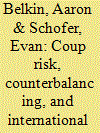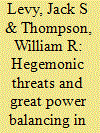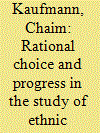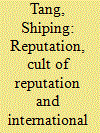|
|
|
Sort Order |
|
|
|
Items / Page
|
|
|
|
|
|
|
| Srl | Item |
| 1 |
ID:
069871


|
|
|
|
|
| Publication |
2005.
|
| Summary/Abstract |
Contrary to the literature on rallies-around-the-flag, this article argues that, in some circumstances, leaders may use international conflict to promote domestic divisiveness. More specifically, the threat of a military coup generally prompts leaders to divide their militaries (a practice known as counterbalancing), and even to engage in international conflict to ensure that various branches of their own armed forces remain distrustful of one another. Two empirical tests of these claims are offered: a large-N statistical analysis that examines whether coup risk leads to counterbalancing, and whether counterbalanced nations engage in more low-level military conflict (controlling for other causes of conflict); and a case study of Georgia shortly after the dissolution of the Soviet Union. Both empirical studies support the arguments advanced by the authors.
|
|
|
|
|
|
|
|
|
|
|
|
|
|
|
|
| 2 |
ID:
069867


|
|
|
|
|
| Publication |
2005.
|
| Summary/Abstract |
The central proposition of balance-of-power theory (albeit one that has never been tested systematically) is that great powers balance against hegemonic threats. This article argues that this proposition applies to hegemonic concentrations of land-based military power in autonomous continental systems, but not necessarily to hegemonic concentrations of sea power in maritime systems. With a focus on continental systems, this article develops and tests several hypotheses linking military concentration, capability changes, and alliance responses for the European system from 1495 to 1999. Judging from existing data on army concentrations and a new database of great-power alliances since 1495, European great powers have demonstrated a strong propensity to balance when one state has acquired a third or more of the total military capabilities in the system, but not at lower concentrations of power; higher concentrations of power usually lead to larger balancing coalitions. Great powers do not always balance, however, so balancing is a probabilistic tendency rather than an "iron law" of behavior.
|
|
|
|
|
|
|
|
|
|
|
|
|
|
|
|
| 3 |
ID:
069869


|
|
|
|
|
| Publication |
2005.
|
| Summary/Abstract |
The second enlargement of the North Atlantic Treaty Organization (NATO) since the end of the cold war fueled an ongoing debate over whether the alliance contributes to democratization in Europe. In the 1990s, critics warned that the 1999 NATO enlargement would cultivate a new cold war and prove irrelevant to democratic consolidation in central Europe. Events have not borne out these forecasts, however. In Poland, not only did NATO build a civilian consensus in favor of democratic control over the armed forces corresponding to NATO norms, but it also delegitimized Polish arguments for defense self-sufficiency that had derived their credibility from Poland's experience of military vulnerability and foreign domination. Such democratizing and denationalizing trends have contributed to stability in postcommunist Europe. An assessment of the seven states that joined in 2004 similarly reveals some scope for NATO's influence in all cases. The alliance's access to domestic reform processes, however, will be uneven across cases in ways largely consistent with the predictions of the theoretical framework in this article.
|
|
|
|
|
|
|
|
|
|
|
|
|
|
|
|
| 4 |
ID:
069873


|
|
|
|
|
| Publication |
2005.
|
| Summary/Abstract |
Through an analysis of eight recent books and a number of articles and papers, this article evaluates recent progress in the study of ethnic conflict, including large scale conflicts and episodic riots. Four main approaches have been applied to the study of ethnic conflict: rational choice, constructivism, essentialism, and structuralism (or realism). This evaluation of recent work includes that rational choice has been the least successful of the approaches; its focus on individuals' pursuit of (mainly) material benefits makes it difficult to recognize or to admit the explanatory power of nationalist feelings that do not depend on the prospect of material benefits. Constructivism has been the most influential approach over the past few decades but until recently has suffered from methodological weaknesses that have hindered testing. Essentialism has been out favor for as long as constructivism has been in, but recent methodological improvements have produced strong work that has resurrected this approach. Structuralism is the youngest approach; it is still immature but has already yielded important new insights. Some eclectic approaches are emerging that combine strengths of the latter three approaches; it remains to be seen whether comparable eclecticism will combine rational choice with one or more of the others
|
|
|
|
|
|
|
|
|
|
|
|
|
|
|
|
| 5 |
ID:
069868


|
|
|
|
|
| Publication |
2005.
|
| Summary/Abstract |
Building on recent scholarship on reputation in international politics, this article argues that, because reputation for resolve cannot form in international conflicts due to anarchy, politicians' persistent belief in the value of reputation for resolve is merely a cult of reputation. After outlining the logic of the cult and an operational code derived from it, this article examines the pattern of influence that the cult has exerted on state behavior in conflicts. It then explores the possible cause of the cult. Finally, it proposes that integrating structural and psychological factors may be a productive enterprise for understanding state behavior, and that further work along this line may lead to interesting findings.
|
|
|
|
|
|
|
|
|
|
|
|
|
|
|
|
| 6 |
ID:
069870


|
|
|
|
|
| Publication |
2005.
|
| Summary/Abstract |
How, in the absence of any link between Iraq and the events of September 11, 2001, was the Bush administration able to go to war against Iraq with widespread political support? Well before the terrorist attacks of September 11, the public was concerned about terrorism, the proliferation of weapons of mass destruction, and Iraq. In the immediate months after the attacks, the public was supportive, at least hypothetically, of military action to remove Saddam Hussein from power. Nonetheless, the Bush administration concluded that such support would be difficult to sustain without an aggressive domestic mobilization campaign. This article examines the influence of four critical factors that enabled the administration to frame the case for war in Iraq: (1) executive-branch information and propaganda advantages, (2) executive cohesion, (3) oppositional fragmentation, and (4) the nature and history of the Iraqi regime.
|
|
|
|
|
|
|
|
|
|
|
|
|
|
|
|
|
|
|
|
|